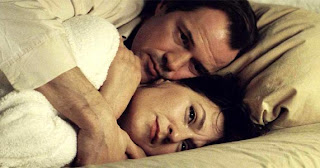I find the German film, The Lives of Others, so deeply poignant, but I had a hard time at first identifying why. In fact, the film still so irrationally moves me that its last line, "No, it's for me" still brings tears to my eyes. [spoiler ahead]
It is 1984 in East Berlin and a Stasi agent is assigned to oversee 24 hour surveillance on one of the country's most acclaimed playwrights. In the process of listening in on the day-to-day activities of the writer and his girlfriend, the Stasi agent Wiesler (played brilliantly by Ulrich Mühe) is inwardly transformed as he is exposed for the first time to music and poetry.
The film centers around a statement by Lenin that is paraphrased in the film: "If I had listened to Beethoven's Appassionata Sonata more, I might not have finished the Revolution." Thus, the central crux is that the appreciation of art softens the heart, making the soul more compassionate and humane. And this is conveyed in a scene in which tears stream down Weisler's face as he eavesdrops on the writer playing a piano piece given to him by a friend who has just committed suicide.
This is man who has never been touched by love. And it is through listening to the lives of others that he is able to experience a part of life that has not been available to him before. What makes this so relevant is that we all experience this when we read a book or watch a film -- when we ourselves become voyeurs of the lives of others. This is a film that celebrates the empathy and compassion that stories can elicit.
The final moments of the film are made so deeply effective by the characters' choices throughout the film. The girlfriend Christa chooses faith in her partner and humanity over the "safety" of following the will of the state (in the form of the advances of lecherous Minister of Culture, Bruno Hempf); the playwright Dreyman chooses to become an activist in the wake of his friend's suicide; and Wiesler himself chooses, in the end, to try and save Dreyman by stealing evidence (a typewriter) that would prove his treason.
But Wiesler's heroic act is one that remains known only to him, its revelation undermined in the face of tragedy, Christa's suicide (as she believes to have betrayed her lover). But it is not until years later, after the wall comes down, that Dreyman learns that he had been under surveillance during the time of his subversive activity (writing an article to expose the high suicide rates in the GDR). Dreyman becomes confused as to why the Stasi did not intervene and goes to their archives (shot AMZAZINGLY in the real Stasi archives) to learn of the man who watched him.
He finds Weisler's initials HGW, learns his name, and goes to find him, to confront him. But upon seeing him, now as a simple, harmless mailman, he changes his mind. And so Weiman's life is to continue without his act of compassion and bravery being acknowledged. Until.....a few years later he passes a bookstore window and sees book promotion for the writer he followed all those years before.
Weiman leaves his mail cart, enters the store, and picks up the book. Inside, the dedication reads "To HGW XX/7, with gratitude". As the camera sits for the few frames on this one page of the book, the power and poignancy of what it means to be seen...appreciated..., LOVED, is utterly profound. The salesclerk asks if he wants it gift-wrapped but Weiman responds, "No, it's for me."



